Coping with Lung Cancer Fatigue: Practical Tips from Patients
Lung cancer treatments can include many side effects. Whatever treatment or combination you choose, it takes a toll. Among people with cancer, 80 percent or more experience fatigue.1,2
Cancer-related fatigue feels more pronounced than pre-cancer fatigue. It can look like:1,2
- Feeling too tired to eat
- Heaviness in your limbs
- Spending more time in bed than out
- Having no energy for activities you enjoy
- Experiencing confusion and lacking the ability to concentrate
To learn what friends and loved ones can do to help you when you are worn down by fatigue, we turned to the LungCancer.net Facebook page. There, we asked community members to tell us: “When experiencing fatigue, what’s the best thing someone can do to help?”
Here is a look at some of the helpful ideas you shared.
Let them sleep
Cancer itself or the treatments may cause fatigue. Many fatigue-causing stressors exist when navigating cancer. Worry, stress, activity level, surgery, and changes in body chemistry can all contribute.1,2
Plus, how long cancer-related fatigue lasts can vary. For some, it may be short or come and go. Others experience fatigue that lasts for years. Treatments can impact fatigue in different ways. When going through chemotherapy, fatigue often cycles. It may begin severely, taper off between treatments, and ramp back up at the next round. However, fatigue does not always go away after cancer treatments end.1,2
No matter the cause or how long fatigue lasts, sleep is often the most effective way to fight it. Letting your loved one sleep – no matter how long or often they need to – can be the best way to help them.1,2
"Let them sleep for 2 or 3 days."
"Let them stay in bed all day."
"Just rest."
"Let them sleep if they want/need to."
"Lie down."
"Let the person sleep, no questions asked."
Bring meals
Fatigue can be a double-edged sword: you feel too tired to cook, but you need healthy food to keep your energy levels up. Many community members mentioned that having loved ones or friends prepare or drop off food for them is incredibly helpful. Having small, easy-to-digest meals and snacks like soups or broths, baked goods, pasta, and fresh fruit on hand is key to staying nourished.
“Bring a meal or 2."
“Prepare small meals like stews and soup. Something I can tolerate.”
"Make the meals for a day or 2."
Help with chores and errands
Cancer-related fatigue impacts your ability to perform basic tasks. You cannot push through fatigue. Walking the dog, doing laundry, or tending to the lawn take more energy than you possess. Having friends, neighbors, and family members help you with day-to-day tasks can lessen your burden.
“Be quiet and help around the house.”
"Offer to run errands or pick up groceries, run the vacuum or wash dishes, any household chore help would have been welcome.”
“When my father-in-law was being treated for cancer, some friends went to his house and did yard work and gardening.”
“All help is welcomed. While I was in the hospital after one of my surgeries, my neighbors jumped in and took care of the lawn. Others took care of the house. It was awesome to see the outpouring of love and support.”
We appreciate everyone who shared their thoughts with us! Learning from one another is incredibly valuable. If you have other tips, share them in the comments.


Join the conversation